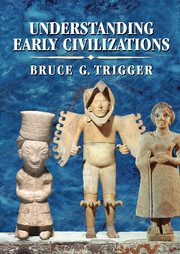29 - Conclusion
Published online by Cambridge University Press: 05 June 2014
Summary
The comparative study of early civilizations documents the capacity of the human mind to generate an almost infinite variety of beliefs and ideas. Art styles, myths, and ecological knowledge differed radically from one early civilization to another, and people's lives were shaped and provided with meaning by values and aspirations that were unique to each. These observations accord with the relativist view that every human group lives in its own culturally constructed environment. While it is impossible to test Marshall Sahlins's (1976: 19) assertion that human beings live in meaningful cultural schemes of their own devising that are never the only ones possible, there is much evidence that makes this proposition appear plausible.
Cultural change does not, however, occur merely as the result of accidental miscopying or alteration in the course of individual decodings of messages. Culture resists random changes by striving to maintain cognitive structures and psychological consistency. The relation between form and meaning is highly complex. In some cases, while texts or icons remain the same, interpretations of them alter significantly over time. Conversely a series of highly varied or rapidly changing texts or symbols may continue to express a single message (Goodenough 1953–68; Marx and Engels 1964: 97–118; 287–347; Panofsky 1939). In these ways, cultural traditions can persist over long periods and adapt to changing conditions.
Yet early civilizations also displayed a vast amount of cross-cultural uniformity, especially in the sociopolitical and religious spheres.
Information
- Type
- Chapter
- Information
- Understanding Early CivilizationsA Comparative Study, pp. 684 - 688Publisher: Cambridge University PressPrint publication year: 2003
